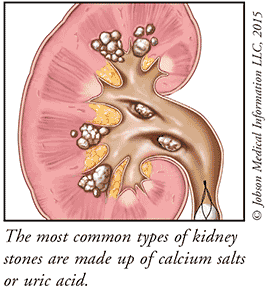US Pharm. 2015;40(8):13-14.
Painful Mineral Deposits in Urinary Tract
Kidney stones are formed from a combination of minerals and waste materials. The stones may not cause symptoms until they move from the kidneys through the ureters and into the bladder. Even small kidney stones can cause intense pain until they pass out of the body. Larger stones may lodge in the urinary tract, leading to infection.
Most kidney stones pass on their own over several days, but some are too large and must be broken up with sound waves or be surgically removed. Patients who have kidney stones are at higher risk for future stone formation. Dietary changes and medications can help lower this risk.

Cause Intense Pain Over Several Days Until Passed Out of the Body
Kidney stones are a common urinary tract disorder, accounting for many emergency room visits in the United States each year.
Risk Factors
Kidney stones are almost twice as common in men as in women. Age is also important; the risk for men increases after age 40 years, while women are more affected during their 50s. Even children can develop kidney stones; teenage girls have the highest risk.
At any age, a diet high in salt, sugar, and protein increases the risk. Drinking an insufficient amount of water may also contribute to stone formation. Overweight or obese people are at higher risk, as are those with a family or personal history of kidney stones. Certain drugs, as well as diseases of the kidneys, gastrointestinal tract disorders, hyperparathyroidism, and gout, all increase the risk for kidney stone formation.
Passing a Stone
There are several types of kidney stones. The most common types are made up of calcium salts (calcium oxalate or calcium phosphate) or uric acid. A less common type, struvite stones, forms as a result of an infection in the urinary tract.
Kidney stones may not cause any symptoms in the kidney, and they may even pass through the urinary tract without causing symptoms if they are very small. The most common symptoms of a kidney stone are pain and blood in the urine, which appears pink or reddish. Most kidney stones large enough to cause these symptoms do so when they move from the kidney, through the ureter, into the bladder, and eventually out the urethra. The pain is usually located in the side of the upper abdomen or along the lower back, and it may be accompanied by nausea, vomiting, and frequent urination. Cloudy or foul-smelling urine can signal an infection.
The diagnosis of kidney stones is based on a history of the symptoms, including the classic signs of intense pain in the lower abdomen and back and blood in the urine. Blood and urine testing, as well as an x-ray, ultrasound, or CT scan, will confirm the presence, size, and location of kidney stones in the urinary tract.
Depending on their size, kidney stones may pass on their own if the patient drinks plenty of fluids. For patients who can be treated at home, pain medication is prescribed if necessary. A medication is sometimes used to relax the ureters and allow the stones to pass more quickly and with less pain. As the stones pass, the patient may be asked to strain the urine to catch the stones. The stones can be analyzed to determine their content, which will help in developing a plan to prevent future stone formation. Larger stones may require lithotripsy or surgery. Lithotripsy is a procedure that uses sound waves to break the stones into smaller pieces so they can pass through the urinary tract easily.
Prevention Strategies
Patients can avoid future kidney stones by preventing the materials that can form stones from concentrating in the urine. Maintaining good hydration by drinking plenty of water each day is a key to prevention. Depending on the results of the stone analysis, a patient may be instructed to make dietary changes, such as lowering salt and protein, avoiding foods with high oxalate content, and eating foods rich in calcium. Kidney stones from calcium salts can be prevented by using diuretics such as hydrochlorothiazide or chlorthalidone, along with potassium citrate to increase urine pH. Prevention of uric acid stones may require the use of allopurinol and potassium citrate. Struvite stones can be prevented by small doses of antibiotic taken daily.
To comment on this article, contact rdavidson@uspharmacist.com.






